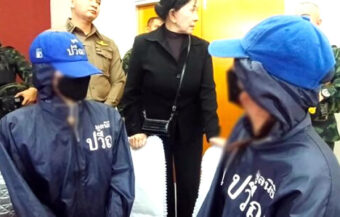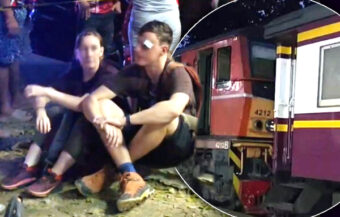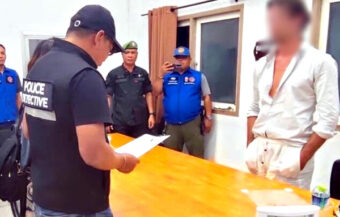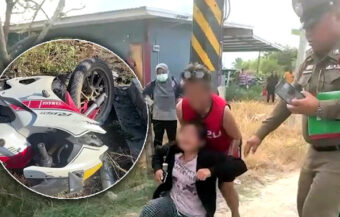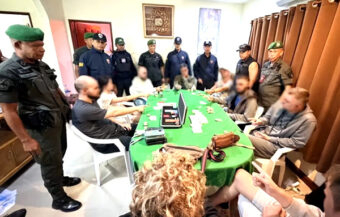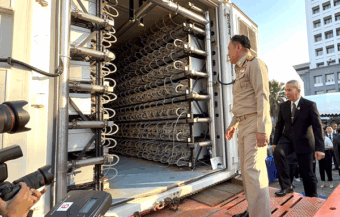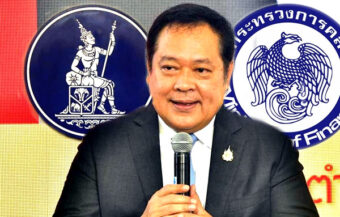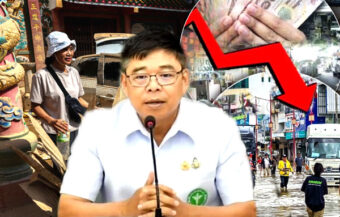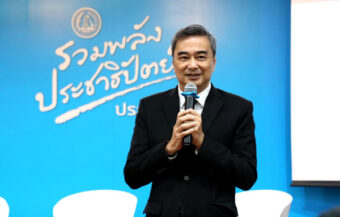Cambodian troops pull back from the tense Chong Bok border, easing the crisis—but Thai PM’s image has taken a hit. Martial law, threatened power and signal cuts seem to have worked. Nevertheless, there remains ongoing brinkmanship as Thailand clamps down on cross-border threats and crime.
On Sunday, reports emerged of Cambodian forces withdrawing from the Chong Bok area in Ubon Ratchathani. Although this doesn’t signal an end to the damaging Thai-Cambodia crisis, it does offer hope for a breakthrough. This development follows the military takeover of Thailand’s border area on Saturday. Subsequently, a series of security measures were announced, including threats to cut internet signals and electricity to nine key areas within Cambodia. However, the full situation remains unclear. Nevertheless, even if these reports prove true, the political damage to Prime Minister Paetongtarn Shinawatra’s leadership will likely persist.
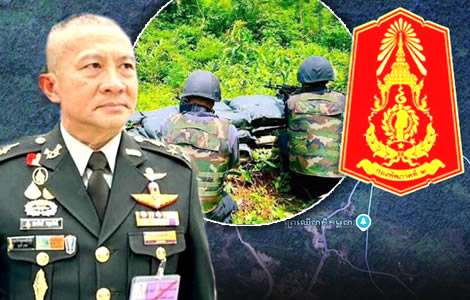
On Sunday evening, credible reports emerged from the Chong Bok border area. Cambodian military units, which had recently encroached on Thai territory, reportedly began to withdraw. This move came after the tense clashes that sparked the May 28 incident. According to local sources, Cambodian troops complied with Thai demands to return to positions held in 2024. This withdrawal ended days of heightened tension and uncertainty along the border.
Furthermore, Cambodia coordinated with Thailand’s 2nd Army before retreating. Both sides agreed to hold regular weekly consultations to maintain peace. This development marks a rare moment of cooperation after a period of escalating conflict. The retreat followed rapid and decisive action by the Thai military.
On Saturday morning, Commander-in-Chief General Songwit Noonpakdee issued martial law orders to close key border areas.
Martial law imposed on Thai-Cambodian border after military talks to secure peace and prevent incursions
This move came after high-level military talks on Friday, coupled with government discussions. The martial law aimed to secure the border and prevent further incursions.
Specifically, Thailand’s military warned of toughening security against illegal activities along the border. Officials emphasized cutting international telecommunications signals reaching disputed zones.
Additionally, on Sunday, military leaders announced plans to cut electricity to nine border points supplying power to Cambodia. This drastic measure would take effect if the border dispute was not resolved promptly.
Now, Thailand faces a critical decision: should it continue efforts to formally delineate the border? Preventing future disputes requires clear lines on the ground. However, confirming the situation in Ubon Ratchathani province remains a priority before taking further steps.
Since Saturday, Thailand has severely restricted border access. Entry and exit across the Thai-Cambodian border are tightly controlled. Nevertheless, commercial shipments and trade continue under stricter rules. This approach seeks to balance security with economic necessity.
Despite these measures, the crisis has dealt a blow to the government led by Prime Minister Paetongtarn Shinawatra. Although the immediate threat may have subsided, the incident has damaged the Prime Minister’s reputation. Critics say it exposed weaknesses in her leadership during a critical national security issue.
Deputy PM Anutin asserts border sovereignty amid rising political tensions linked to the Shinawatra family
On Sunday, Deputy Prime Minister Anutin Charnvirakul, who also serves as Interior Minister, visited Ubon Ratchathani. There, he declared Thailand’s borders inviolable and reaffirmed national sovereignty.
However, he also alluded to the close relationship between the Shinawatra family and Cambodian strongman Hun Sen. While his comments appeared supportive of the Prime Minister, some interpreted them as a subtle critique. Indeed, political theatre. Especially so in light of damning criticism from arch-conservative groups of the PM and former Prime Minister Thaksin Shinawatra.
Also on Sunday, the Senate, known to oppose the Pheu Thai Party and back the Bhumjaithai Party, called for a joint parliamentary session. Both houses were urged to convene and review the Thai-Cambodian crisis.
This move signals rising political pressure to address border security decisively. On June 8, 2025, at 5:47 p.m., renowned military journalist Wassana Nanuam posted on Facebook. She confirmed that Cambodia had withdrawn from Thai territory.
She noted that the 2nd Army had secretly negotiated the withdrawal. According to her report, Cambodian soldiers agreed to retreat and cover the Kulet area. Both sides arranged for weekly military talks at the border to prevent future conflicts.
Cambodian forces initiate talks for troop withdrawal at Chong Bok border with Thai military approval
Earlier that day, at 10:00 a.m., Cambodian forces contacted the Suranaree Task Force to request negotiations at the Chong Bok border. The Suranaree Force reported this to Lieutenant General Boonsin Phadklang, Commander of the 2nd Army.
He then informed General Phana Klaewplodthuk, Commander-in-Chief of the Royal Thai Army. After approval, the Suranaree Force sent representatives to negotiate directly with Cambodia. The talks concluded with a mutual agreement to return to positions held in 2024.
Cambodia was also ordered to restore the Kulet area to its original condition. This joint retreat marked a significant step toward de-escalation. Moreover, military officials from both countries committed to weekly talks at the border to foster communication and peace.
This measure aims to prevent misunderstandings that could reignite tensions. Meanwhile, the National Peacekeeping Council (NPKC) had been preparing to escalate its response. Proposals included cutting electricity and suspending internet signals reaching Cambodian border areas.
These measures target illegal activities such as technological crimes and human trafficking, which undermine Thailand’s security.
Military leader details Cambodia’s border encroachments and justifies martial law and strict control measures
General Songwit Noonpakdee, who leads the Royal Thai Armed Forces and the Center for Prevention and Resolution of Border Security Threats (CPC), explained the military’s stance. He stated that Cambodian armed forces had encroached on Thai sovereignty.
Despite Thailand’s efforts through bilateral mechanisms, Cambodia had not responded positively. Instead, Cambodia increased troops, weapons, and military positions near the border. This buildup raised concerns about possible incidents that could harm local civilians.
In response, the Royal Thai Army and Navy, following the National Security Council’s resolution and Defense Ministry policies, imposed strict control measures. All border crossings are now tightly regulated to protect Thailand’s sovereignty and territorial integrity.
These controls follow Special Army and Navy Orders issued on June 7, 2025. In effect, it imposed martial law on selected border areas, subordinating civilian authority to military orders. To enforce these measures, border provinces serve as command centres.
Relevant agencies assist the Suranaree Task Force, Burapha Task Force, and the Chanthaburi and Trat Border Defense Commands in maintaining peace and controlling border crossings.
Border crime targeted by Immigration Bureau with checks to combat tech crime and human trafficking
The Immigration Bureau also tightened checks on people crossing the border, especially in high-risk districts known for tech crimes and gambling dens. Those districts include Kap Choeng in Surin Province, Ban Kruat in Buriram, Aranyaprathet in Sa Kaeo, Pong Nam Ron in Chanthaburi, and Khlong Yai in Trat Province.
These areas are hotspots for cross-border crime networks that traffic humans and commit cyber crimes. Authorities have reported ongoing criminal activities, including technology crimes and human trafficking. These crimes harm the economic and social conditions in Thailand and neighbouring countries.
To combat them, the CPAC (Center for Prevention and Suppression of Technology Crimes and Human Trafficking) issued terse demands. It called on Cambodia to crack down on all perpetrators and their supporters.
Moreover, CPAC plans to raise prevention measures, including cutting electricity and blocking internet signals in gambling and scam areas. It will also control goods and equipment that facilitate these crimes.
These proposals are set to be presented to the National Security Council. CPAC coordinates with government agencies to ensure that these measures protect national interests. Importantly, they aim not to disrupt daily life for border communities. CPAC will continue to monitor the situation and adapt as needed.
Thailand threatens power cuts at key border points if Cambodia escalates troop deployments or causes clashes
Adding to the pressure, the Commander of the 2nd Army warned Cambodia. If Cambodian forces increase their presence or cause clashes, Thailand will cut power to nine points, including the Poipet casino area.
This was a clear escalation, showing Thailand’s readiness to enforce its sovereignty firmly. On June 8, the 2nd Army also enforced strict control over all border crossings. This followed Army Order No. 806/2568, aimed at protecting the safety of local residents.
However, the strict measures caused difficulties for border trade. Cambodian traders expressed concerns over limited crossing times, which force hurried transactions or overnight stays on the Thai side.
Thai vendors similarly feel the pressure but support the military’s protective actions. The 2nd Army continued to assess the situation closely. If Cambodian troops were redeployed, further power cuts would be implemented at key border points.
Among these points are five under Army Operations and four under Navy Operations Centers. This step underlines Thailand’s determination to defend its borders while maintaining law and order. In summary, the Thai-Cambodian border crisis has entered a new phase. Cambodia’s withdrawal has calmed tensions temporarily. However, Thailand remains vigilant.
Border tensions ease temporarily but Thailand remains vigilant with ongoing military and control measures
The government and military have implemented stringent measures to prevent future encroachments and cross-border crimes. Political ramifications continue as parliament and public activists demand stronger responses.
This situation has revealed a link between diplomacy, security, military operations and Thailand’s unique and byzantine domestic politics. The weekly military talks promise ongoing dialogue. Yet, the threat of economic sanctions including power and internet cuts, is still on the table. Thailand aims to protect its sovereignty while balancing relations with its neighbour.
Martial law declared in border areas with Cambodia as military takes command of Thailand’s tense standoff
Thai Cambodian border tensions worsen as matters threaten to spill over into the kingdom’s politics
Dangerous impasse between Thailand and Cambodia as PM rules out International Court of Justice (ICJ)
In the coming weeks, all eyes will be on Ubon Ratchathani and other border provinces. Confirmation of troop positions and adherence to agreements will be vital. In particular, the proposed June 14th meeting of the Joint Border Commission (JBC) will be important. Firstly the question of whether it will still go ahead and secondly what will be the outcome.
The Thai government must also repair its battered image after the crisis. There is a need to repair the perception of the Prime Minister’s leadership. This crisis has left it looking weak and ineffective.
Overall, this episode highlights the fragile nature of peace along the Thai-Cambodian border. It also shows how quickly tensions can escalate. Certainly, it highlights how critical careful diplomacy and strong military measures are to maintaining stability. Notably, Thailand also faces similarly challenging situations on all its borders including those with Myanmar, Laos and Malaysia.
Join the Thai News forum, follow Thai Examiner on Facebook here
Receive all our stories as they come out on Telegram here
Follow Thai Examiner here
Further reading:
Dangerous impasse between Thailand and Cambodia as PM rules out International Court of Justice (ICJ)
Hun Manet confirms Cambodia ultimately may decide to send border dispute with Thailand to the Hague
Khmer soldier killed in deadly gunfire between Thai and Cambodian armies near Ubon Ratchathani

